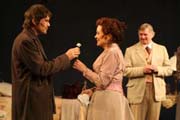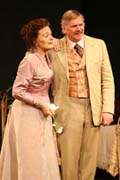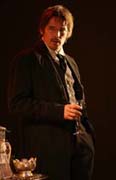
Lucy Komisar
"The Cherry Orchard"
"The Cherry Orchard"
Written by Anton Chekhov, a new version by Tom Stoppard.
Directed by Sam Mendes.
Presented by The Bridge Project (BAM and The Old Vic).
Harvey Theater, 651 Fulton Street (Nevins stop on IRT 1,2,3,4,5,6 trains)
718-636-4100.
Opened January 14, 2009, closes March 8, 2009.
Reviewed by Lucy Komisar, January 25, 2009.
http://www.bam.org/.
 |
| Ethan Hawke, Sinead Cusack, and Paul Jesson in "The Cherry Orchard." Photo by Joan Marcus. |
Tom Stoppard's adaptation of Chekov's "The Cherry Orchard" is the perfect companion piece to his 2002 Russian trilogy, "The Coast of Utopia." The trilogy told about the formation and early activities of the 19th- century Russian revolutionaries who fought the aristocratic class headed by the Czar. Chekov's 1904 play describes the frivolous, aristocratic leisure class which hasn't a clue that it is being swept away by embryonic capitalists, while downtrodden workers and peasants wait in the background, ready to join up with Stoppard's radicals.
It's presented by director Sam Mendes with a top-notch cast that makes you think of characters living on the edge of reality while the world inches up behind them. All occurs on a stark set that is mostly bereft of furnishings, just some oriental rugs, and stuffed pillows. The colors are browns, grays, purples --earth tones -- except for the startling blood red gown of the grande dame.
Chekhov's aristocrats' inability to pay the interest on their mortgaged properties becomes a metaphor for the bankruptcy of their whole class. The naïveté of landowner Ranevskaya (Sinead Cusack) and her family is subtly suggested by their love of the nursery, where they sit on diminutive chairs and have tea served on a tiny table. Sinead deftly interprets Ranevskaya as good-natured but self-indulgent and silly, with no sense of reality either about her own faithless lover or the economic precariousness of her estate.
 |
| Sinead Cusack and Paul Jesson in "The Cherry Orchard." Photo Joan Marcus. |
Her snooty brother Gaev (Paul Jesson), who denigrates those he thinks are beneath him, demonstrates his own lack of reality by walking around with a stick which he pokes in the air in imagined pool shots. Jesson aptly portrays him "to the manor born," with some charm and no sense.
The past is ironically represented also by Firs (masterfully acted by Richard Easton), the elderly servant who refused to accept freedom when the serfs were liberated and continues to hover over his masters, scolding them as if he were the boss and sharing their snobbery.
The future is embodied by Lopakhin, created by the incomparable Simon Russell Beale, with a working-class British accent. He is a merchant with an eye for good investments as well as complicated feelings about the estate where his father and grandfather were servants, banned even from entering the kitchen.
Beale shows his complexity, as he appears to pay obeisance to Ranevskaya, to hold her in some awe, at the same time he upbraids her for not taking the only step that can save the land – cutting down the cherry orchard and leasing the land for plots for summer houses. Her head still in the clouds, she replies, "it's so tawdry."
The snobby pretentious Gaev calls the merchant a vulgarian. But when he remarks to Varya (Rebecca Hall), his sister's adopted daughter, that Renevskaya (who'd been living with a lover in Paris) has loose morals, we know who the true vulgarian is. Hall's strong, uncompromising Varya makes us think of someone who would have bloomed after the feminist movement.
The importance that aristocratic Russian society gave to family is emphasized by Charlotta (Selina Cadell), Anya's German governess, who is also a musician and entertainer. She feels she doesn't belong anywhere, because she doesn't know who her parents were and therefore where she fits in the social pecking order. She proclaims, "There is no one I can talk to, I am all alone. Who I am and what I am is a mystery." Cadell plays her as someone who indeed doesn't belong, who seems dropped from another world into this one.
 |
| Ethan Hawke in "The Cherry Orchard." Photo by Joan Marcus. |
In fact, the production gives us a sense of people who are on the cusp of either the past or the future. The ideals of the future are represented by Lopakhin and by Petya (Ethan Hawke), a radical student whose desultory manner masks an understanding the others don't share.
A macabre stylized masked dance is the final paen to the aristocrats' fantasy life. That is followed by Lopakhin's dance of celebration as they leave: "Make way for the landlord," he cries, as he throws over the chairs the dancers had sat on.
But Petya knows that the shift to the capitalists won't last long. Conjuring up a device similar to that of "The Coast of Utopia," Mendes surreally evokes the future as peasants standing in a line of shadows, hovering silently over the estate that Ranevskaya and her family will lose. It's a powerful moment in a memorable production.
| museums | NYTW mail | recordings | coupons | publications | classified |
